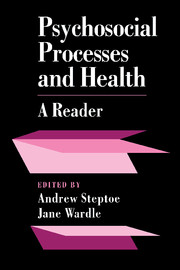Book contents
- Frontmatter
- Contents
- Preface
- Section 1 Life stress, social support and health
- Section 2 Psychophysiological processes in disease
- Section 3 Personality, behaviour patterns and health
- Coronary heart disease in the Western Collaborative Group Study: final follow-up experience of 81/2 years
- Anger-coping types, blood pressure, and all-cause mortality: a follow-up in Tecumseh, Michigan (1971-1983)
- Pessimistic explanatory style is a risk factor for physical illness: a thirty-five-year longitudinal study
- Effectiveness of hardiness, exercise and social support as resources against illness
- Section 4 Health practices and the modification of health risk behaviour
- Section 5 Coping with illness and disability
- Section 6 Behavioural interventions in medicine
- Index
Pessimistic explanatory style is a risk factor for physical illness: a thirty-five-year longitudinal study
from Section 3 - Personality, behaviour patterns and health
Published online by Cambridge University Press: 05 August 2016
- Frontmatter
- Contents
- Preface
- Section 1 Life stress, social support and health
- Section 2 Psychophysiological processes in disease
- Section 3 Personality, behaviour patterns and health
- Coronary heart disease in the Western Collaborative Group Study: final follow-up experience of 81/2 years
- Anger-coping types, blood pressure, and all-cause mortality: a follow-up in Tecumseh, Michigan (1971-1983)
- Pessimistic explanatory style is a risk factor for physical illness: a thirty-five-year longitudinal study
- Effectiveness of hardiness, exercise and social support as resources against illness
- Section 4 Health practices and the modification of health risk behaviour
- Section 5 Coping with illness and disability
- Section 6 Behavioural interventions in medicine
- Index
Summary
Abstract
Explanatory style, the habitual ways in which individuals explain bad events, was extracted from open-ended questionnaires filled out by 99 graduates of the Harvard University classes of 1942-1944 at age 25. Physical health from ages 30 to 60 as measured by physician examination was related to earlier explanatory style. Pessimistic explanatory style (the belief that bad events are caused by stable, global, and internal factors) predicted poor health at ages 45 through 60, even when physical and mental health at age 25 were controlled. Pessimism in early adulthood appears to be a risk factor for poor health in middle and late adulthood.
Do our habits of explaining bad events when we are young predict our physical health in later life? Several lines of evidence imply that such explanatory styles might predict subsequent ill health. For example, research with animals suggests that uncontrollable bad events make poor immune functioning and illness more likely (Laudenslager, Ryan, Drugan, Hyson, & Maier, 1983; Sklar & Anisman, 1979; Visintainer, Volpicelli, & Seligman, 1982). And research with humans suggests that individuals who explain such bad events pessimistically have lowered immune function (Kamen, Rodin, & Seligman, 1987) and, over a 1-year span, make more doctor visits than do individuals who explain bad events optimistically (Peterson, 1988). We set out to investigate whether individuals who explain bad events pessimistically in early adulthood have more illness in middle and late adulthood.
We believe that an adequate investigation of early psychological precursors of illness and death should meet several stringent methodological requirements:
The research design must be longitudinal and span enough time for change in illness status to occur; this may require several years or even decades. Our study covers a 35-year period.
The initial health status of research participants must be known when the investigation begins. We began with certifiably healthy members of the Harvard University classes of 1942-1944.
An adequate number of research participants must be studied because links between psychology factors and illness—if they exist—are probably modest. We used 99 subjects.
Objective measures of health and illness that go beyond self-report must be available at the time the investigation begins, during the study, and at the time at which it ends.
- Type
- Chapter
- Information
- Psychosocial Processes and HealthA Reader, pp. 235 - 246Publisher: Cambridge University PressPrint publication year: 1994
- 1
- Cited by



